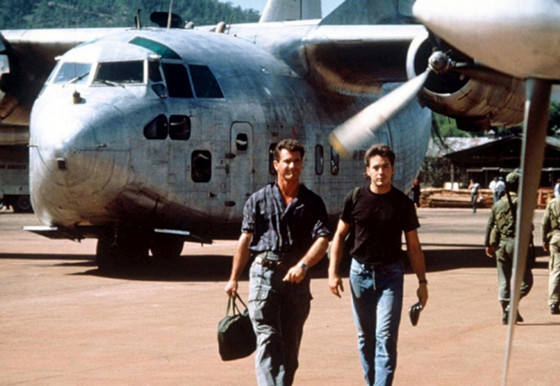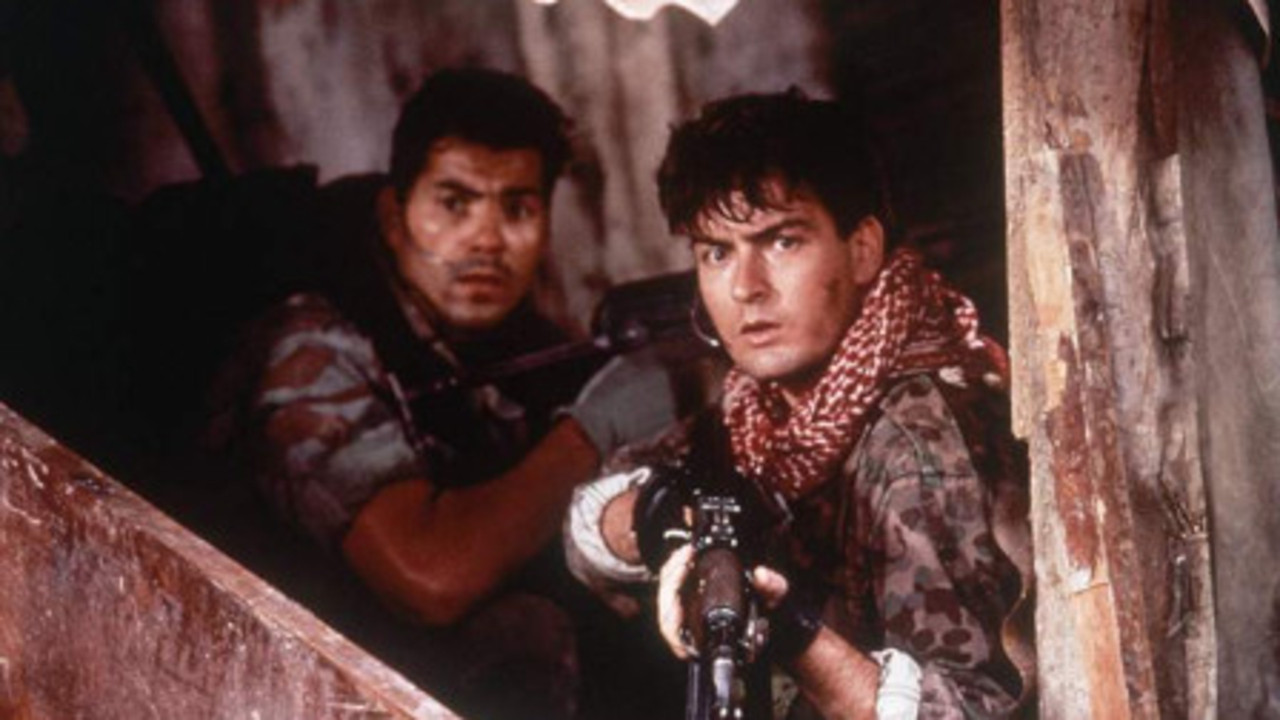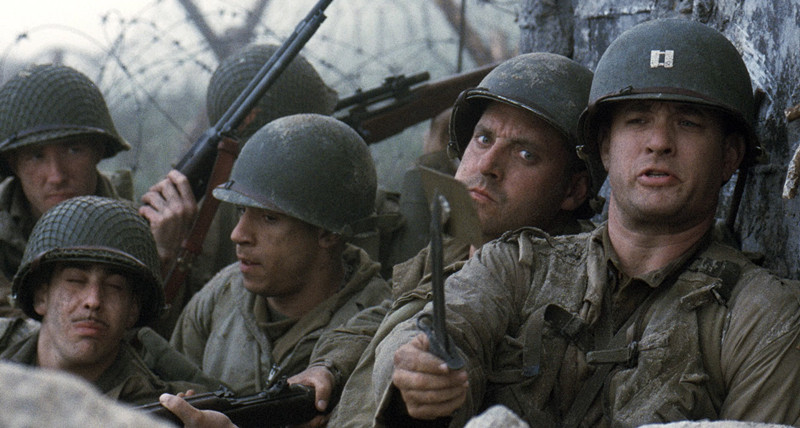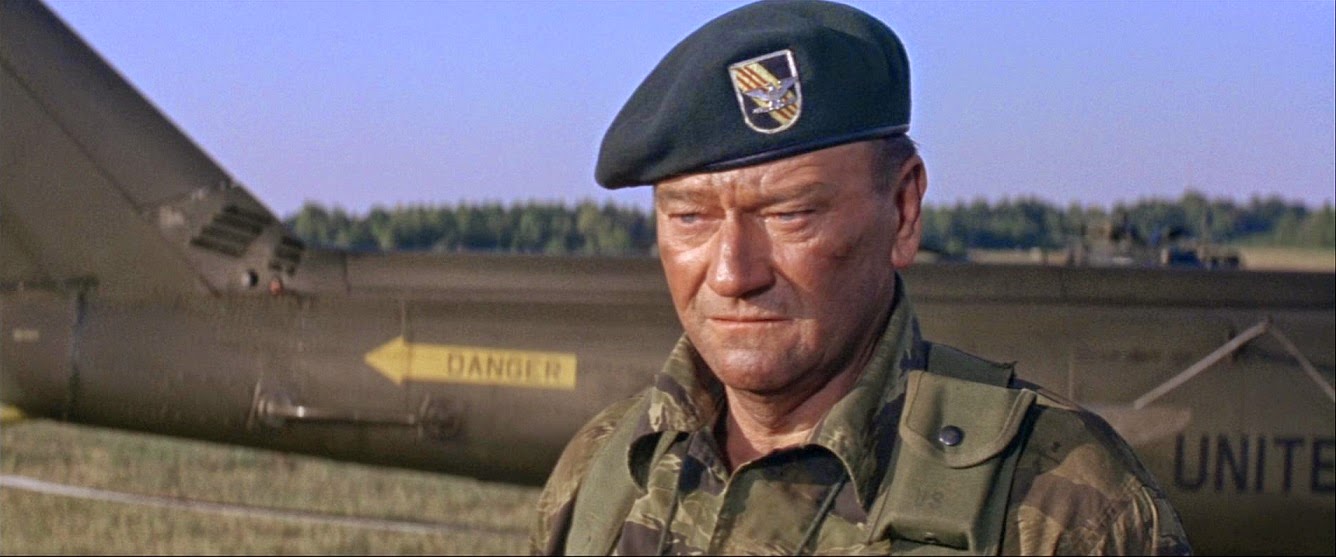5. Air America – Cynic Have Secret Hearts of Gold

War is something that makes a lot of people into cynics, and a cynic is generally nothing more than a frustrated idealist. There are plenty of examples in war movies where former idealists give up and do bad things because they think there’s no hope of making any difference.
Despite the fact that cynics started out as idealists, it’s not all that common for them to form cynical habits and then turn back toward their original ideas. Habits die hard, especially if they’re justified over and over by the mental gymnastics required to do things one is ashamed of doing. After repeating the soothing lies that doing wrong isn’t wrong because there is no wrong to oneself, suddenly shifting back to believing in right and wrong is quite a wrench, and in most cases habit wins in the end.
In Air America we see a self-righteous pilot played by Robert Downey Jr. sent to fly missions in Laos during the Vietnam War after he loses his license in the States. He soon learns that the other pilots are all weary cynics, cheating because they’ve learned that the government mission in Laos is cheating even worse, transporting drugs for a local drug lord in their own planes whether they want to or not. Mel Gibson’s character has taken up gun-smuggling but has simultaneously adopted a number of eastern philosophical tenets in his life, which is where the problem lies.
Becoming disillusioned with your native beliefs is not uncommon today, as those native beliefs are often mere naiveté, because a few parents and almost no schools bother to teach critical thinking or bolster their own belief-systems by contrasting them with competing belief-systems. Many young people are shocked to discover that not everybody agrees on what is right and what is wrong.
Now a man who went to Laos firmly believing in his own patriotism and the justice of the mission could be easily disillusioned to find that his superiors are cheating madly. How does he react? Would he become a mere cynical drug dealer, helping as best he can the secretly criminal purpose of the traitors that are in charge? Would he turn whistleblower either openly or secretly, and gather information to bring them down? Would he still believe his original ideals, not despite but BECAUSE of the way they are being flouted?
The Hollywood answer is fairly standard: he’ll become sorta kinda cynical, start his own criminal enterprise while adopting a fig leaf’s worth of native beliefs to cover his rotten behavior.
This is common to many movies, and it is these cynics who often end up being the super-warriors at the end of the show. In Air America Mel Gibson’s character abandons his whole stock of weapons to save a plane-load of kids who are being shelled by mortars. So what wakes up the idealist who has been habitually turned into a criminal cynic? Apparently, according to Rousseau and Hollywood, inside every criminal sleeps a heart of gold just waiting for the right opportunity.
In reality habitual criminals are not all that likely to suddenly change their habits, hence the word ‘habitual.’ They’ve spent years justifying their wicked behavior in their own minds, and overcoming the hardened tracks in their brains is something that requires an actual miracle. It’s nice to believe that cynics are all really nice guys underneath, but in reality that is the true naiveté.
4. Navy Seals – Adrenaline Junkies make the Best Soldiers

Charlie Sheen plays Lieutenant Hawkins in this fun and exciting movie from 1990, and he also plays the adrenaline junkie that forms a major subplot of the movie. Despite the fact that his lust for combat gets one of the other SEALs killed, it is treated more as a minor issue than a career-killing flaw.
With so many authentic or authentic-seeming bits to this movie, the inclusion of a man who puts his own excitement ahead of the good of the team is a glaring error. He’s a lieutenant, as well, 2nd in command, over the petty officers and chiefs that form most of the team. An officer who disregards the safety and well-being of his men is always a problem in any military unit, but in a specialist organization like the SEALs it would get him axed immediately.
A small, specialist team like a SEAL team requires a greater degree of trust than more common military units. Each member of the team relies on the others to be in the right place at the right time, to stick to the plan, and to guard each other with absolute sureness. Behind enemy lines is the norm, and if one cannot depend on the others of his team, death is extremely likely.
Just jumping off the bridge in such a careless way would’ve disqualified Lt. Hawkins from the teams. Nobody would trust him, and that would be the end of that.
Hollywood of course loves the colorful characters, and there’s nothing wrong with that. There are some characters that, especially in war movies, are just too colorful to be at all believable.
3. Saving Private Ryan – Soldiers spent their downtime navel-gazing

Saving Private Ryan has some stupendous battle scenes, but in the times between the eclectic group sent to find and rescue Ryan spends a lot of time acting not like the ‘Greatest Generation,’ but instead seem to be insecure and self-doubting ‘Baby Boomers.’
It seems unlikely that all of the soldiers in Captain Miller’s (Tom Hanks) tiny command would all be college graduates who majored in philosophy, yet that does seem to be how it worked in the movie. Whenever there’s a spare moment they sit around talking about the meaning of life and morality and so forth, and while that may feel very satisfying to the navel-gazing crowd, it doesn’t seem likely.
The attitudes of the ‘Greatest Generation’ were a lot more down-to-earth than that. Robert Howard wrote, in the mouth of Conan the Barbarian: “Let teachers and philosophers brood over questions of reality and illusion. I know this: if life is illusion, then I am no less an illusion, and being thus, the illusion is real to me. I live, I burn with life, I love, I slay, and am content.”
The angsty self-consciousness of the Baby Boomer is rather out of place in World War II. It’s not that the millions who served in World War II were all simple-minded by comparison, though many Baby Boomers flatter themselves that this was the case, but that philosophical musings have their time and place, which is not a behind-the-lines bull session. In barracks, maybe, but not in enemy territory.
This is again a device to get the director’s philosophical musings into the movie, which is fine. However it makes a jarring note in the harmony, breaking the suspension of disbelief that a movie should always try to maintain.
2. The Green Berets – American Wars are Pure and Righteous

The Green Berets is a movie that tried hard for realism about the Vietnam War, with the full cooperation of the US Military. It is one of many movies going back to the 30s that portrayed American soldiers in a very sympathetic light. This John Wayne movie shows the training and preparation of the Green Berets and explains their tactical doctrine better than any other movie about any war…however it also accepts uncritically that in the Vietnam Conflict America was entirely justified in every way. Americans and their loyal Vietnamese allies are unalloyed good guys, and the Viet Cong and NVA were unalloyed bad guys.
The title song of The Green Berets was actually written by a Green Beret, Staff Sergeant Barry Sadler. Believe it or not, that song, The Ballad of the Green Berets, was a big hit in its day—five weeks at number one. The attitudes of the time were obviously much different from what we see in popular culture now, and both song and movie came out while that culture was in transition.
Despite the realism of many parts of the movie—if anything it understated the brutality of the Viet Cong—the overarching attitude of ‘American is Always Right’ is not, and has never been true. There is no point in rehashing all the arguments about the Vietnam War, and just because the general consensus today is that America was NOT justified in entering the conflict doesn’t mean it’s correct. However the uncritical assumption of righteousness is often incorrect.
Even in a war that is truly and totally justified, any organization as large as an army is going to have bad apples galore, at every level. War brings out the best in some, and the worst in others. To be fair that is portrayed in even the most over-the-top patriotic movies, while the overarching justification for war is often left to one side.
John Wayne was a very patriotic actor, and he appeared in a number of movies that served up America the always-justified as a simple unquestionable assumption. This is not a bad attitude to have, once the war is started, as whether or not either side is justified become moot once the shooting commences. At the same time, looking at things from a historical perspective after the fact, it does not seem quite the ‘we were all angels/they were all devils’ that movies like The Green Berets would have one believe.
And of course there is one fantasy element in The Green Berets that is utterly laughable. David Janssen plays a reporter embedded with the Green Berets and comes to the conclusion that his former opposition to the war was completely unjustified. A reporter changing his mind because of mere evidence? Now THAT is fantastic!
1. Braveheart – Heavy Cavalry is God

Because of its association with the upper class, the cavalry has always included a dash of romance, but in military terms it has never had quite the punch that its proponents would prefer to believe. Braveheart, despite having some of the best battle scenes ever to appear on the screen, falls for this fallacy, and one of the actors (Gerard McSorley) actually says: “You are outmatched, you have no heavy cavalry. No army in two centuries has won without it.”
Now that attitude is to be expected from a leader of heavy cavalry; knights always thought they were the pinnacle of military power. Leaving aside the fact that the term ‘heavy cavalry’ wasn’t actually in use at the time, even knights, and especially English knights, knew, whether they would admit it or not, that the foot were more important the horse. Edward I, the very king depicted in Braveheart, outlawed football and made archery the national sport, trying to bring up the numbers of trained longbowmen who dominated the battles of the next century.
What’s more, the rough wooden spears depicted in the movie would’ve been superfluous. Horses just don’t charge into massed ranks of men; they’re not the ones in the fight for glory or medals. They just know that running into a solid mass will kill them, so they won’t do it. The simple fact is that charging cavalry usually makes the men facing them run away, and knights, men-at-arms, cossacks, hussars, and whatever kind of cavalry you like, spend most of their time chasing down and killing fleeing foes. Infantry who stand firm in the face of cavalry ALWAYS win.
So the nifty trick of picking up sharpened stakes to kill the chivalry was both ahistorical and militarily useless. It makes for a good show, and once again, that trumps accuracy.
The leaders of the English army at Stirling knew the relative value of horse and foot as well as anybody of the age would: they had 3,000 cavalry, and about 10,000 infantry. They might’ve thought knights ruled, but that didn’t make them fools enough to rely on them alone.
Author Bio: James Wilson nerds for a living and writes in his spare time. He lives in the mountains of Arizona, well above the desert. His books and other writing may be found at www.sunderedpheres.com.